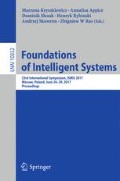Abstract
Computational models of argument aim at engaging argumentation-related activities with human users. In the present work we propose a new generalized version of abstract argument system, called Trust-affected Bipolar Weighted Argumentation Framework (T-BWAF). In this framework, two mainly interacting components are exploited to reason about the acceptability of arguments. The former is the BWAF, which combines and extends the theoretical models and properties of bipolar and weighted Argumentation Frameworks. The latter is the Trust Users Graph, which allow us to quantify gradual pieces of information regarding the source (who is the origin) of an argument. The synergy between them allow us to consider further gradual information which lead to a definition of intrinsic strength of an argument. For this reason, the evaluation of arguments for T-BWAF is defined under a ranking-based semantics, i.e. by assigning a numerical acceptability degree to each argument.
Access this chapter
Tax calculation will be finalised at checkout
Purchases are for personal use only
References
Amgoud, L., Ben-Naim, J.: Ranking-based semantics for argumentation frameworks. In: Liu, W., Subrahmanian, V.S., Wijsen, J. (eds.) SUM 2013. LNCS (LNAI), vol. 8078, pp. 134–147. Springer, Heidelberg (2013). doi:10.1007/978-3-642-40381-1_11
Amgoud, L., Ben-Naim, J.: Axiomatic foundations of acceptability semantics. In: Proceedings of the International Conference on Principles of Knowledge Representation and Reasoning, KR, vol. 16 (2016)
Amgoud, L., Cayrol, C.: A reasoning model based on the production of acceptable arguments. Ann. Math. Artif. Intell. 34(1–3), 197–215 (2002)
Bench-Capon, T.: Persuasion in practical argument using value-based argumentation frameworks. J. Logic Comput. 13(3), 429–448 (2003)
Cayrol, C., Lagasquie-Schiex, M.C.: On the acceptability of arguments in bipolar argumentation frameworks. In: Godo, L. (ed.) ECSQARU 2005. LNCS (LNAI), vol. 3571, pp. 378–389. Springer, Heidelberg (2005). doi:10.1007/11518655_33
Dung, P.M.: On the acceptability of arguments and its fundamental role in nonmonotonic reasoning, logic programming and n-person games. Artif. Intell. 77(2), 321–357 (1995)
Dunne, P.E., Hunter, A., McBurney, P., Parsons, S., Wooldridge, M.: Weighted argument systems: basic definitions, algorithms, and complexity results. Artif. Intell. 175(2), 457–486 (2011)
Leite, J., Martins, J.: Social abstract argumentation. In: IJCAI, vol. 11, pp. 2287–2292 (2011)
Parsons, S., Tang, Y., Sklar, E., McBurney, P., Cai, K.: Argumentation-based reasoning in agents with varying degrees of trust. In: AAMAS-Volume, vol. 2, pp. 879–886 (2011)
Pazienza, A., Esposito, F., Ferilli, S.: An authority degree-based evaluation strategy for abstract argumentation frameworks. In: Proceedings of the 30th Italian Conference on Computational Logic, pp. 181–196 (2015)
Acknowledgments
This work was partially funded by the Italian PON 2007–2013 project PON02_00563_3489339 ‘Puglia@Service’.
Author information
Authors and Affiliations
Corresponding author
Editor information
Editors and Affiliations
Rights and permissions
Copyright information
© 2017 Springer International Publishing AG
About this paper
Cite this paper
Pazienza, A., Ferilli, S., Esposito, F. (2017). On the Gradual Acceptability of Arguments in Bipolar Weighted Argumentation Frameworks with Degrees of Trust. In: Kryszkiewicz, M., Appice, A., Ślęzak, D., Rybinski, H., Skowron, A., Raś, Z. (eds) Foundations of Intelligent Systems. ISMIS 2017. Lecture Notes in Computer Science(), vol 10352. Springer, Cham. https://doi.org/10.1007/978-3-319-60438-1_20
Download citation
DOI: https://doi.org/10.1007/978-3-319-60438-1_20
Published:
Publisher Name: Springer, Cham
Print ISBN: 978-3-319-60437-4
Online ISBN: 978-3-319-60438-1
eBook Packages: Computer ScienceComputer Science (R0)

